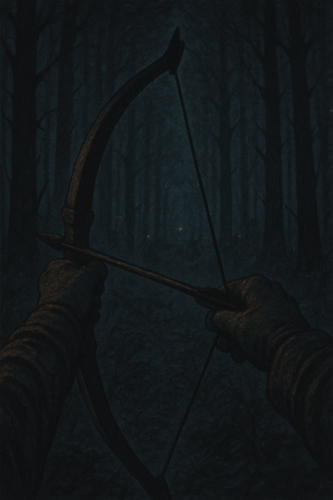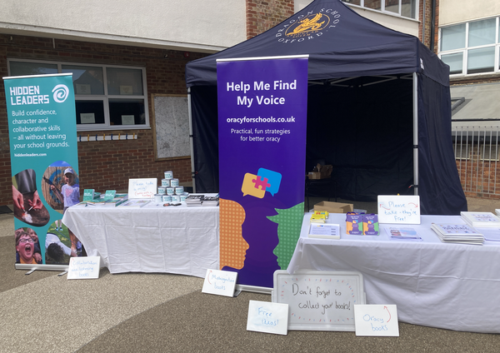This week, a stimulus about the possibility of alien life out there somewhere, and whether we should be making active steps to try and make contact. It was well received in last week’s online philosophy sessions at www.p4he.org. Don’t say that’s what the session will be about, just go straight into the stimulus.

Stimulus 1 – The Dark Forest
Imagine you’re a hunter, alone in a dark wood. Around you in the forest, you hear faint noises. You think there might be other hunters out there, maybe friendly, maybe not. You don’t know how many there are, or if there are any at all. You’re ready to defend yourself if you have to. You’re armed with a bow and arrow. Maybe they have guns, maybe they don’t even have bows and arrows. Maybe there’s one who wants the forest to themselves and will do whatever it takes to make that happen. Maybe they’re looking for other hunters they can work with to make life easier. Or maybe they’re just like you, wondering who else is out there and what they should do.
What would be the sensible thing to do in that situation? The discussion of this question may bring in elements of risk, reward, curiosity, vulnerability, probability, uncertainty, taking precautions, trying to observe without being seen – just the same themes that can be explored in the “main course” of the session.

Stimulus 2 – Say Hello?
What this session is really about is not a lone hunter in the forest. Instead, it’s about a big question, a planet-sized question. Should we try to find and contact alien civilisations? Or should we “stay quiet” and hope that, if they exist, nobody notices us?
A much more advanced civilisation might just possibly be able to pick up the faint echoes of everyday radio and TV broadcasts. But there have also been a few messages deliberately sending an inter-stellar hello to other places in our galaxy – probes, or radio signals. Those are much stronger signals that can be detected a very, very long way away by equipment similar to that of our most powerful observatories.
The hunter in the dark forest story is meant to be an analogy. An analogy is like a simile, but with different parts that all match up – the hunter is the human species; the dark forest is the vastness of space.
How else is the hunter like us as a species (deciding whether to try to contact other planets, or “stay quiet”)?
Do you think the analogy works?
Or are there things that don’t match up?
Should we send out “hello” messages that will show where we are, or stay as quiet as we can?
A few discussions led to “counsels of despair” – that we’d already sent such signals, or that any hostile, predatory civilisations aout there would already know about us. But it seems the messages we’ve sent that would travel furthest have all been very directional, such as message sent from the Arecibo observatory (pictured) to the M13 star cluster, or the Voyager probes. So we’ve sent postcards but not put up a welcome banner and it’s still a live question.
What’s Happening in the Philosoverse?
On Monday 19th May, 6 p.m. Tom will be hosting the next p4c.com Third Monday Masterclass, this time on the theme of questioning. What are the questions that push thinking deeper and open up new avenues within a philosophical enquiry? What questions should you ask when, and who to? And how can you get children asking more questions of their own?
It’s free, courtesy of our collaboration with SAPERE to run the world’s best philosophy for children resources website, where you’ll find lots of our work amongst a cornucopia of resources from dozens of P4Cers around the world. It’s on zoom, reserve your place here.
Today, Tom is at Sarum Hall School, North London, returning for the fifth time for a set of workshops incorporating puzzles, problem-solving and debate with Year 6. It’s an annual fixture for us at hiddenleaders.com and leads to huge jumps in children’s abilities to listen, think on their feet and lose inhibitions. Sound like something that could work for you? Get in touch!
Lots of work on trips abroad over the next few terms – to Jersey, Czech Republic, Thailand, Australia. Tom has been sharing opportunities for developing oracy with the IAPS at their recent T&L Festival in Oxford. If you’ve got a conference or event coming up that you’d like us to provide free books, ideas and resources for, contact Tom today.

And Jason was at the launch yesterday for Darren Chetty’s picture book, “I’m Going to Make a Friend” and throwing in a philosopher’s cocktail party on the theme of friendship.
Best wishes,
Jason and Tom
P.S. One of the courses Jason offered on the last P4HE Weekender was “Close Enough Fermi”, about Fermi questions, named for the mathematician famous for making surprisingly accurate estimates from limited information. Build up from estimating how many pencils “The Rock” weighs, via the number of bricks in the school, the number of books in the world, to the most famous Fermi question of all, the Drake equation of how many alien civilisations should there be in our detectable area of the universe. They can create their own version, and it’s in the nature of the beast that if there are lots of variables, the overestimates and underestimates tend to cancel each other out, so that your guess is roughly as good as anybody’s! This is about the perfect activity to stretch the brightest minds of any age, as the maths is not tricky – it’s just adding or taking away zeros.